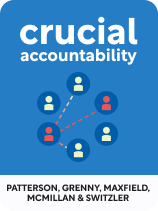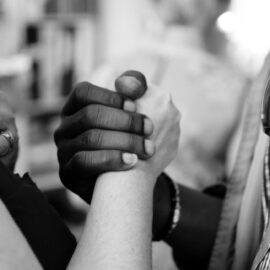

This article is an excerpt from the Shortform book guide to "Crucial Accountability" by Kerry Patterson, Joseph Grenny, et al.. Shortform has the world's best summaries and analyses of books you should be reading.
Like this article? Sign up for a free trial here .
When should you discuss accountability in relationships? What three questions should you ask yourself before discussing sensitive accountability issues?
Accountability in relationships can be a tough issue to tackle. Stakes are high when the relationship could end up permanently damaged. According to the book Crucial Accountability, there are a few questions you should ask yourself before discussing accountability in relationships.
Keep reading to learn three key points to consider before discussing accountability in relationships.
How Many Times Has the Issue Occurred?
When determining the key issue to center your discussion around, the frequency of the behavior in question can indicate what you should focus on. Consider this before discussing accountability in relationships.
- If the issue has only occurred once, the key issue is probably the specifics of the behavior (the authors call this a “content” issue).
- If the issue has occurred more than once, your key issue could be that the behavior is becoming a pattern.
- If the behavior persists even after it’s been addressed, the key issue could be the impact that the behavior has on your relationship with the other person.
| Do the Authors Make Artificial Distinctions Between Types of Issues? While the authors make a distinction between specifics (“content”) issues, pattern issues, and relationship issues, the three are often interconnected and tend to ultimately boil down to a relationship issue at the core. For example, even if you identify the issue as a pattern problem, your discussion is still going to focus on how the pattern is affecting your relationship. Furthermore, specifics issues are also frequently indicative of a relationship issue—while you might not like the specifics of the behavior, the reason you don’t like it is likely because of what it indicates about your relationship. Experts explain that when you get upset with another person over little things, like when they always leave the cap off the toothpaste (pattern issue) or put an empty container back in the fridge (specifics issue), the small issue itself might not be what’s making you upset. Instead, you’re probably upset about a problem within the relationship that these smaller issues indicate, like partner negligence or their lack of respect for your wishes. |
What’s Really Bothering Me?
The authors contend that the key issue is often one of two things: either the consequences of the other person’s behavior or your perception of their intent. It is important to figure out which of these applies before discussing accountability in relationships.
To figure out which it might be, consider that what’s really bothering you is not the person’s actions themselves, but the consequences those actions have on you and others involved.
- For example, imagine you carpool to work with a friend that consistently runs late, making you late as well. Consequently, you struggle to complete your tasks by the end of the day, hold up the team meeting in the morning, and have lost a promotion due to your tardiness. Your accountability grievance might not be that she’s typically late in her personal life, but rather the consequences that you face under these circumstances.
Alternatively, it may be the other person’s intent that’s bothering you, or at least what you think is their intent.
- Maybe your issue with your tardy best friend is that you think that she’s abusing your friendship and using you for rides without considering how her tardiness might impact you.
Sorting out which aspect of the behavior is ultimately bothering you will help you figure out how to steer your accountability conversation.
| Differentiating Between Consequences and Intent Experts explain that determining whether the key issue is about consequences or intent can be a confusing and high-stakes decision. Sometimes you might focus on the other person’s intent, when in reality, the other person intended well but didn’t understand the consequences of their actions. For example, maybe they told a joke that they thought was funny but was actually offensive, without intending to offend. In this scenario, you may have misunderstood their intent because your own insecurities or sensitivities led you to take offense to the situation. As a result, the other person might be shocked and offended to discover that you assumed the worst of them. So, not only can it be hard to truly identify when the issue is with ill intent, but choosing to bring up this assumption puts the relationship at risk as well. Psychologists recommend asking the following questions to help better differentiate between consequences and intent so we can avoid jeopardizing the relationship with false accusations. 1. How else can I understand what happened and why? 2. Might the other person have meant well but been unaware of how this would make me feel? 3. Do they possibly have a different definition of right and wrong, acceptable and unacceptable? 4. Might I feel hurt due to my own insecurities and sensitivities, and not because the other person was trying to hurt or disregard me? |
What’s My Ideal Outcome?
The authors write that you can further narrow down the key issue by considering your ultimate goal: What do you want to happen and what don’t you want to happen? This is the final step to consider before addressing accountability in relationships.
- For example, what do and don’t you want to happen with your best friend? You do want to help her get to work. You don’t want to be late. You do want to maintain a positive relationship with her, but you don’t want to feel taken advantage of.
Use your dos and don’ts to determine what’s most important to you and if solving one issue might also resolve the others. In the above example, your dos and don’ts point to the fact that you should probably first address the recurrence of the tardiness issue and discuss the consequences that you’ve been facing as a result. If the issue persists after this discussion, then you can address the negative impacts that it’s starting to have on your relationship.
| Don’t Let Revenge Be One of Your “Dos” Experts explain that when considering our dos and don’ts, people often prioritize their desire for revenge over their desire to solve the issue. In fact, it’s human nature to do so—behavior specialists explain that when we’re harmed or threatened by others, our primal instinct is to exact revenge, and this clouds our rational judgment on how to handle the issue. When we feel the red-hot desire for revenge swell within us, experts explain that we should acknowledge the feeling, and then simply let it go. As the authors explain, the only way to effectively handle an accountability issue is to address it—exacting revenge will give you temporary gratification but will leave the problem unresolved and ultimately damage the relationship. |

———End of Preview———
Like what you just read? Read the rest of the world's best book summary and analysis of Kerry Patterson, Joseph Grenny, et al.'s "Crucial Accountability" at Shortform .
Here's what you'll find in our full Crucial Accountability summary :
- How to broach sensitive conversations with loved ones and coworkers
- How to prepare for, execute, and follow up on accountability conversations
- How to solve issues while improving your relationships






